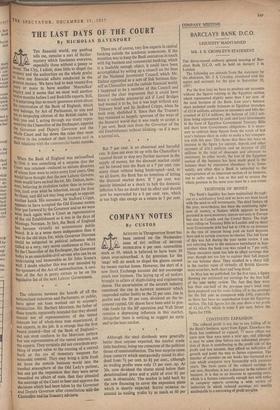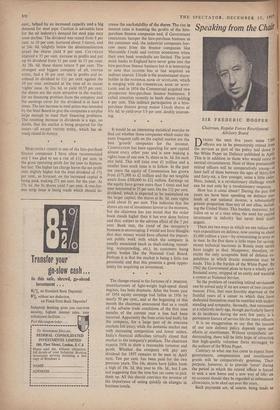COMPANY NOTES
By CUSTOS ACTIVITY in Throgmorton Street has been centred on the Wednesday issue of £41 million of BRITISH PETROLEUM 6 per cent, convertible stock at 99, which is believed to have been 10 times over-subscribed. A fat premium for the 'stags' will do much to dispel the gloom caused by recent market losses. However, the start of a new Stock Exchange account did not encourage much new business. The laying up of oil tankers brought in sellers of shipbuilding and engineering shares. The uncertainties of the aircraft industry restrained the rise in HAWKER SIDDELEY which responded rather feebly to the 22 per cent, rise in profits and the 10 per cent. dividend on the in- creased capital. Oil shares have been sold to pro- vide funds for the BP operation and Wall Street remains a depressing influence in this market. Altogether there is nothing to suggest an early end to the bear market.
* * *
Although the steel dividends were generally better than anyone expected, the market made little headway, being too conscious of the political threat of renationalisation. The best surprise came from cONSETT which unexpectedly raised its divi- dend from 74. per cent. to 8+ per cent., although its trading profits were only 15 per cent. up. At 20s. cum dividend the shares stand below their denationalised price and a yield of over 8+ per cent. is obtainable. The market is held back by the new financing to cover the expansion plans which is shortly expected. SOUTH DURHAM M- C:leased its trading ?routs by as much as 60 per cent., helped by an increased capacity and a big demand for steel pipe. Caution is advisable here for the oil industry's demand for steel pipe may soon decline. The dividend was raised from 8 per cent. to 10 per cent. (covered about 5 times), and at 24s. 9d. (slightly below the denationalisation price) the shares yield 8 per cent. COLVILLES enjoyed a 35 per cent. increase in profits and put up its dividend from 11 per cent. to 13 per cent. At 28s. 6d. these shares return 9 per cent. The strongest and biggest company of all, UNITED STEEL, had a 38 per cent. rise in profits and in- creased its dividend to 111 per cent. against the 10 per cent. estimated at the time of its recent 'rights' issue. At 21s. 6d. to yield 10.55 per cent. the shares are the most attractive in the market, for no financing problem faces the company and the earnings cover for the dividend is at least 4 times. The last increase in steel prices was intended by the Steel Board to give the companies a surplus large enough to meet their financing problems. The resulting increase in dividends is a sign, no doubt, that the market is being prepared for the issues—all except UNITED STEEL, which has al- ready raised its money.
* * *
MERCANTILE CREDIT is one of the hire-purchase finance companies I have often recommended and I was glad to see a rise of 13+ per cent. in the gross operating profit for the year to Septem- ber last. The higher tax charge leaves the net profit only slightly higher but the final dividend of 17+ per cent., as forecast, on the increased capital is being paid, making 27+ per cent. for the year. At 27s. 6d. the 5s. shares yield 5 per cent. A one-for- one scrip issue is being made which should in- crease the marketability of the shares. The rise in interest rates is boosting the profits of the hire- purchase finance companies and, if Government restrictions hamper the hire-purchase business at the consumer end, the industrial companies bor- row more from the finance companies like Mercantile Credit and UNITED DOMINIONS when their own bank overdrafts are limited. The joint stock banks in England have never gone into the hire-purchase finance business but it is interesting to note that LLOYDS has at last acquired an indirect interest. Lloyds is the predominant share- holder in the NATIONAL BANK OF SCOTLAND, which is merging with the COMMERCIAL BANK OF SCOT- LAND, and in 1954 the Commercial acquired two prosperous hire-purchase finance businesses. I called attention recently to bank shares yielding 6 per cent. This indirect participation in a hire- purchase finance group makes Lloyds shares at 43s. 6d. to yield over 5.9 per cent. doubly interest- ing.
It would be an interesting statistical exercise to find out whether those companies which make the most frequent calls on the capital market are the best 'growth' companies for the investor. CEMENTATION has been appealing for new capital almost every other year and is now making a rights issue of one new 5s. share at 6s. 3d. for each two held. This will raise over £1 million and a smaller loan stock issue is to follow. In the past ten years the equity of Cementation has grown from £171,000 to £2 million and the net tangible assets from £500,000 to £3f million. Earnings on the equity have grown more than 5 times and last year amounted to 35 per cent. On the 12+ per cent. dividend, which is expected to be maintained on the larger capital, the shares at 8s. 3d. cum rights yield about 8f per cent. This indicates that the shares are out of investment favour at the moment, but the' chairman has just stated that the order book stands higher than it has ever done before and that, subject to the adverse effect of the 7 per cent. Bank rate, the trend of the company's business is encouraging. I would not have thought that dear money would have affected the import- ant public work with which the company is usually associated (such as shaft-sinking, tunnel- ling, waterproofing, etc.), its customers being public bodies like the National Coal Board. Perhaps it is that the market is being a little too pessimistic and that this presents a good oppor- tunity for acquiring an investment.
The change-round in the fortunes of F. PERKINS, manufacturers of light-weight high-speed diesel engines, has been dramatic. After the boom year of 1954 equity earnings had fallen in 1956 by nearly 50 per cent., and at the beginning of this month the chairman announced that as a result of the adverse trade conditions of the first nine months of the current year a loss had been incurred. Apparently the Suez crisis had badly hit the company, for a large part of its overseas markets fell away, while the domestic market met with increasing competition and lower orders. India's financial difficulties virtually • closed that market to the company's products. The chairman expects 1958 to show a reasonable turnover and profit. Whether the company will pay any dividend for 1957 remains to be seen in April next. Ten per cent. has been paid for the two previous years. The 10s. shares have fallen from _ a high of 19s. 3d. this year to 10s. 3d., but I am not suggesting that the time has yet come to pick them up. All this should convince the investor of • the importance of acting quickly on changes in business trends.







































 Previous page
Previous page